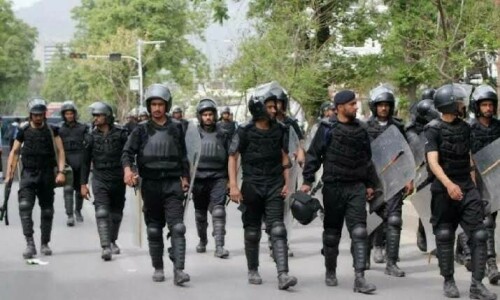WASHINGTON, March 31: US military prosecutors have charged a Tanzanian Al Qaeda leader held at Guantanamo Bay with war crimes for the 1998 US embassy bombings in Africa and are seeking his execution, the Pentagon said on Monday.
The Defence Department said Ahmed Khalfan Ghailani had been charged on nine counts including murder related to the August 1998 bombing of the embassy in Dar es Salaam, Tanzania, which killed 11 people and injured hundreds.
“Six of the nine charges carry the maximum penalty of death,” Brigadier General Thomas Hartman, legal adviser to the Office of Military Commissions at Guantanamo Bay, told reporters.
“It is important to remember that these sworn charges are only allegations of violations under the Military Commissions Act and that the accused is and will remain innocent unless proven guilty beyond a reasonable doubt,” he said.
Susan Crawford, the convening authority for Guantanamo trials, will review the evidence submitted by prosecutors and decide whether there is enough cause to refer him to trial.
Ghailani was arrested in Pakistan in July 2004 after a shootout with police, and officials said in early 2005 that he had been handed over to US custody. He had been on the FBI’s list of most-wanted terrorists and had a five million dollar bounty on his head.
The Pentagon said that after the twin bombings in Tanzania and Kenya, which altogether killed more than 200, Ghailani worked as a bodyguard for Al Qaeda leader Osama bin Laden, and forged documents and trained recruits.
Prosecutors accused Ghailani of playing an instrumental role in the Dar es Salaam bombing, including buying explosives and detonators, and moving the bomb components to various safe houses around Tanzania’s biggest city.
They alleged the Al Qaeda suspect scouted the US embassy with the suicide bomb driver, met with conspirators in Nairobi, Kenya, shortly before the bombing, and joining them on a flight to Pakistan a day prior to the attack.
If Ghailani does stand trial on capital charges, he would be executed if found unanimously guilty by a military commission comprising 12 jurors.
He joins six other Al Qaeda detainees facing capital charges at Guantanamo Bay including Khalid Sheikh Mohammed, the self-confessed mastermind of the Sept 11 attacks of 2001 which killed nearly 3,000 people.
The charges against the six were filed in February, rekindling a heated controversy that has dogged the special process that the United States has put in place to try “war on terror” suspects.
Adding fuel to the reaction was the CIA’s admission that waterboarding, a form of simulated drowning widely denounced as torture, had been used nearly five years ago in interrogations of Mohammed.
In October 2001, just after the devastating attacks on New York and Washington, four Al Qaeda extremists were sentenced to life without parole by a Manhattan court for their part in the East Africa bombings.
A total of 15 Guantanamo detainees have now been charged under the Military Commissions Act, which was hurriedly passed by Congress in 2006 to answer Supreme Court objections to the previous system of military justice.
Only one case has completed its course through the controversial Guantanamo trial system. “Aussie Taliban” David Hicks reached a plea deal with prosecutors and completed his sentence on home soil when he returned to Australia in May.
Ghailani’s arrest was hailed as the biggest coup in the hunt for Al Qaeda since Pakistan captured Mohammed in March 2003.
After 9/11 Ghailani hid in the turbulent South Waziristan tribal area on the border with Afghanistan, but was driven out by a major Pakistani military operation, according to Pakistani security sources.
Pakistani officials said Ghailani was part of a “sleeper cell” and had received personal messages on computer disks from bin Laden ordering him to carry out new attacks.
When he was arrested he was drawing up plans for a missile strike on an airliner at Nairobi airport in Kenya as well for attacks on London’s Heathrow Airport and US financial institutions, the officials said.—AFP












































Dear visitor, the comments section is undergoing an overhaul and will return soon.